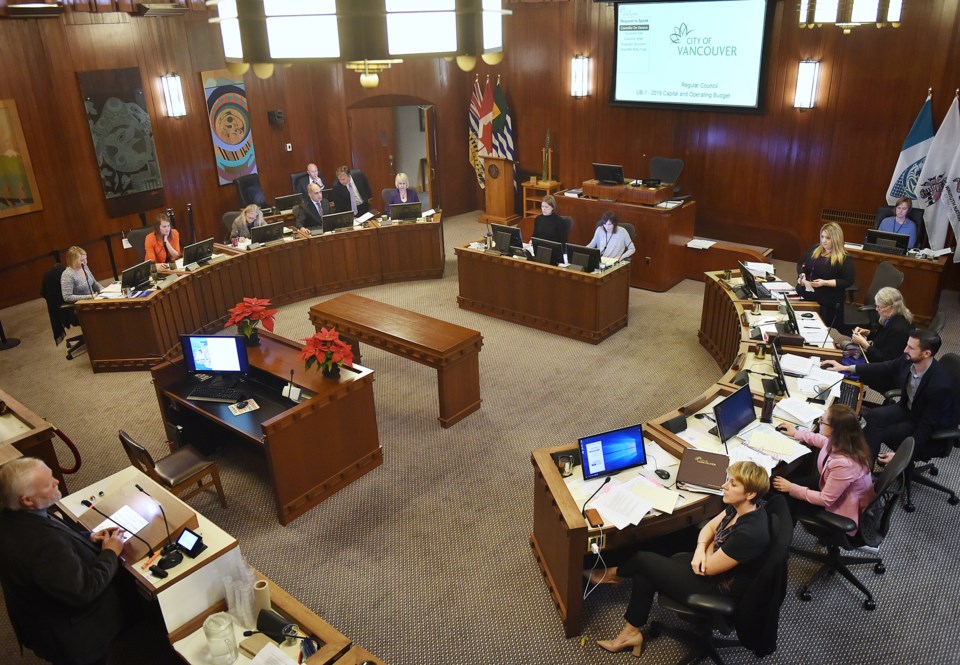At the end of the month the year 2020 arrives. So get ready for a lot of bad puns about vision â 20/20, of course, refers to the measure of visual acuity, or sharpness of vision.
For Â鶹´«Ã½Ó³»taxpayers, however, the outlook can be clearly summed in one word: âexpensive.â
Thatâs because proposed property tax increase of the draft budget, including the cost increases for utility fees from Metro Vancouver, is a record-smashing 9.3 per cent.
You are forgiven for feeling light-headed upon hearing this news.
Vancouverâs new mega-spending budget will be the first full expression of this city council, as they had rubber-stamped the previous one left by the Vision council.
The proposed 9.3 per cent budget increase therefore belongs to Mayor Kennedy Stewart and his 10 councillors â unless something miraculous happens between now and the beginning of the fiscal year in April, that is.
Instead of a thoughtful deliberation with the public on spending priorities, the city seems hellbent on ramming it through before the holiday season.
Council must demand more time for a thorough budget review.
The mayor came out recently defending the increase. Naturally, he did so by positioning it as a way to increase budgets and firefighters. The current budget includes hiring 25 new police officers and 30 new firefighters, with the VPD budget increasing 7.3 per cent since 2019.
While more cops and firefighters make for convenient politics, should we not be debating these increases in the face of the cityâs many years of plummeting crime statistics and the broad implementation of fire suppression systems in buildings?
Yes, theft from autos is on the rise, but that statistic relates to the failure to address the opioid crisis and demand for street drugs, which is a problem that deserves a separate solution than just hiring more first responders. Read on the Swiss model for an approach on how to deal with it.
Councillors Adriane Carr and Christine Boyle have also publicly endorsed jacking up our taxes, both arguing that Vancouverites are getting such a good deal we should be happy to pay more. Whether each of them has enough political capital stored up to withstand disgruntled city taxpayers will be borne out in the next election.
The average salary earner in our city would be lucky if they are getting an annual two per cent cost of living increase like most public service workers. Put your hand up if your boss just gave you a pay increase just shy of 10 per cent.
How we arrived at the 9.3 per cent rate is not hard to explain. Under Mayor Gregor Robertsonâs watch, the city drifted away from the principles of fiscal prudence. Remember all the stories about the costing us millions? More than likely it was just the tip of the iceberg.
A decade ago, Â鶹´«Ã½Ó³»was in the throes of a sudden global economic downturn, and the city responded with a short-term hiring freeze. It also conducted an overdue âcore reviewâ of services to find ways to harmonize work being done by multiple departments.
No one on council â and most certainly not the mayorâs office, which has the budget and staff to shape councilâs agenda â is proposing an operational review of the cityâs bureaucracy. How will anyone know if the city is getting the best bang for its buck without one?
While in other parts of the world local governments are innovating by adopting 21st century smart technology and machine learning, Â鶹´«Ã½Ó³»still has a horse-and-buggy approach to services such as permitting. The backlogs in those departments are said to be driving up the cost of building housing here.
Where is the City of Vancouverâs innovation agenda, and why isnât council asking that question?
Another financial risk the city faces that no one wants to talk about is the fact approximately 10 per cent of Vancouverâs budget goes to debt servicing, at a time when interest rates are at record lows. If and when interest rates rise, taxpayers will get a double whammy as the city tries to contain costs.
This council loves to talk about how unaffordable our city is. Letâs see what they do with the one tool they actually have to make it more affordable.



